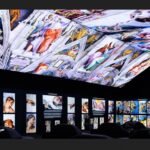The multiverse theory in science fiction posits the existence of parallel universes or alternate realities beyond our own.
These hypothetical universes may have different physical laws, historical events, or even variations in the lives of individuals. The concept of the multiverse allows authors to explore a vast array of possibilities and scenarios, offering a rich tapestry for storytelling.
Authors often use the multiverse theory as a narrative device to examine themes such as identity, choice, destiny, and the nature of reality itself. By introducing multiple realities, writers can delve into the consequences of different decisions, the idea of free will versus determinism, and the complexities of human nature. Through the lens of the multiverse, stories can challenge readers to consider the moral, philosophical, and existential implications of a reality where anything is possible.
Origins of the Multiverse Concept in Literature
The concept of the multiverse, with its layers of alternate realities and divergent timelines, has roots that stretch back through the annals of literature. Ancient myths and folklore often hinted at the existence of parallel worlds, setting the stage for more formal explorations in later works of fiction. It was in the realm of speculative fiction that authors began to delve into the intricate possibilities offered by the multiverse, challenging readers to contemplate the infinite variations of existence.
Authors such as H.G. Wells and Philip K. Dick paved the way for the multiverse concept in literature, introducing audiences to worlds where the laws of physics could be bent, and reality itself became a malleable construct. These early explorations laid the foundation for a rich tapestry of storytelling, inspiring future writers to push the boundaries of imagination and explore the implications of multiple realities on characters and plot.
Notable Works of Science Fiction Exploring Alternate Realities
In the realm of science fiction, there are several notable works that have delved into the concept of alternate realities. One such example is Philip K. Dick’s novel “The Man in the High Castle,” which explores a world where the Axis powers emerged victorious in World War II, leading to a divided America under German and Japanese rule. This alternate history narrative raises thought-provoking questions about the nature of power, resistance, and the impact of historical events on society.
Another renowned work is Michael Crichton’s “Timeline,” where a group of archaeologists find themselves transported back in time to medieval France through a technology that allows for multiverse travel. As they navigate this unfamiliar world, they must grapple with the consequences of altering the past and the ethical dilemmas that come with manipulating different realities. Such stories not only captivate audiences with their thrilling adventures but also invite reflection on the fragility of existence and the infinite possibilities that the multiverse theory offers.
Common Themes in Multiverse Storytelling
Themes in multiverse storytelling often revolve around exploring the nature of reality, the concept of identity, and the consequences of altering events across different dimensions. Characters often grapple with moral dilemmas when faced with choices that could impact not only their own lives but also the fates of countless other versions of themselves. Each reality presents unique challenges and opportunities, leading to reflections on the nature of free will and destiny.
Another common theme is the idea of interconnectedness between different realities, highlighting how actions in one dimension can have ripple effects across the multiverse. This theme often delves into the complexities of cause and effect, as characters navigate the intricate web of relationships and events that bind together the various iterations of themselves and the worlds they inhabit. Ultimately, multiverse storytelling serves as a rich tapestry for exploring philosophical questions about the nature of existence and the boundaries of possibility.
Implications of Multiple Realities on Characters and Plot
Exploring the concept of multiple realities in storytelling opens up a wide range of possibilities for character development and plot intricacies. Characters are often faced with the challenge of navigating through different versions of themselves, each existing in parallel universes. This can lead to internal conflicts as they grapple with their own choices and consequences across various realities, ultimately shaping who they are as individuals.
Furthermore, the presence of multiple realities can significantly impact the plot dynamics by introducing twists and unexpected turns. Writers have the creative liberty to craft intricate narratives where characters interact with alternate versions of themselves or encounter parallel versions of the same events. This adds layers of complexity to the storylines, engaging readers or viewers in a thought-provoking exploration of how diverging realities can influence character motivations and plot progression.

The Role of Technology in Multiverse Exploration
Advancements in technology have played a pivotal role in the exploration of multiverses within the realm of science fiction. Whether through sophisticated machinery or intricate digital simulations, writers have intricately woven tales of characters traversing through parallel dimensions and alternate realities. These technological tools serve as the gateway for protagonists to venture into the unknown, setting the stage for riveting narratives filled with suspense and curiosity.
In many science fiction works, the depiction of highly advanced technology serves not only as a means of transportation between multiverses but also as a catalyst for profound philosophical reflections. The intricate design of these technological marvels often mirrors the complex nature of existence itself, blurring the lines between reality and illusion. As characters grapple with the implications of traversing multiple dimensions, the role of technology becomes more than just a plot device—it becomes a symbol of humanity’s insatiable thirst for knowledge and discovery.
Critiques and Ethical Considerations of Multiverse Narratives
As with any narrative concept, multiverse storytelling is not without its critiques and ethical considerations. Critics argue that the use of multiple realities can sometimes lead to convoluted plots and confusing character arcs, potentially alienating audiences who struggle to follow the intricate web of alternate timelines. Furthermore, some individuals question the ethical implications of characters manipulating different realities for personal gain or to avoid consequences, as this can blur the lines between right and wrong within the storytelling framework.
Ethically speaking, multiverse narratives raise questions about the impact of individual choices and their repercussions across various realities. Characters may grapple with moral dilemmas when faced with decisions that could have vastly different outcomes in different universes, highlighting the complex nature of human behavior and the uncertainties that come with multiple realities. Additionally, the portrayal of moral relativism in multiverse storytelling challenges viewers to reconsider their own perceptions of right and wrong, sparking conversations about the fluidity of ethics in a world where choices can diverge into countless paths.
Multiverse in Popular Culture and Media
Multiverse concepts have permeated popular culture and media, captivating audiences with their boundless realms of possibilities. From television shows like “Stranger Things” to blockbuster films such as “Doctor Strange,” the notion of multiple realities continues to fascinate and intrigue viewers worldwide. These diverse representations of the multiverse in various forms of entertainment offer a glimpse into the imaginative depths of storytelling that explore alternate dimensions, parallel universes, and the consequences of interdimensional travel.
Additionally, the multiverse has become a recurring theme in video games, with titles like “Bioshock Infinite” and “The Legend of Zelda: Ocarina of Time” incorporating multiple realities and diverging timelines into their narratives. Gamers are drawn into complex storylines that challenge their perceptions of reality and immerse them in worlds where their choices have far-reaching consequences across different dimensions. As technology continues to advance, we can expect to see even more innovative and immersive depictions of the multiverse in popular culture and media, inviting audiences to ponder the infinite possibilities that lie beyond our own universe.
Influence of Multiverse Theory on Scientific Research
When exploring the influence of multiverse theory on scientific research, it becomes evident that speculative fiction has often served as a wellspring of inspiration for real scientific inquiry. Imagining the existence of multiple universes with varying physical laws and possibilities has sparked curiosity among scientists, prompting them to reconsider fundamental principles and explore the boundaries of our understanding of the cosmos. The notion of parallel realities, each with its own set of rules, has led to intriguing thought experiments that challenge conventional thinking and offer new avenues for scientific exploration.
One of the key impacts of multiverse theory on scientific research lies in its ability to push the boundaries of theoretical physics and cosmology. By postulating the existence of multiple universes, scientists are prompted to reconsider long-held beliefs about the nature of reality and the fundamental constants that govern our universe. The concept of a multiverse forces researchers to think beyond traditional constraints and consider the implications of interconnected yet distinct realities, sparking interdisciplinary collaborations and innovative approaches to understanding the universe we inhabit.
Future Trends in Multiverse Storytelling and Speculation
As the exploration of multiverse theory continues to captivate audiences across mediums, future trends in multiverse storytelling are poised to push boundaries even further. One key trend to watch for is the increased use of immersive technology such as virtual reality and augmented reality to enhance the audience’s experience of navigating through multiple realities. This interactive approach allows viewers to actively participate in the story, blurring the lines between fiction and reality.
Additionally, future multiverse narratives may delve deeper into the ethical considerations of meddling with alternate realities. Questions surrounding the consequences of altering different timelines and the impact on individual identity are likely to be central themes. By engaging with these complex ethical dilemmas, storytellers can challenge audiences to reflect on the potential implications of exploring the vast expanse of the multiverse.





Leave a Reply